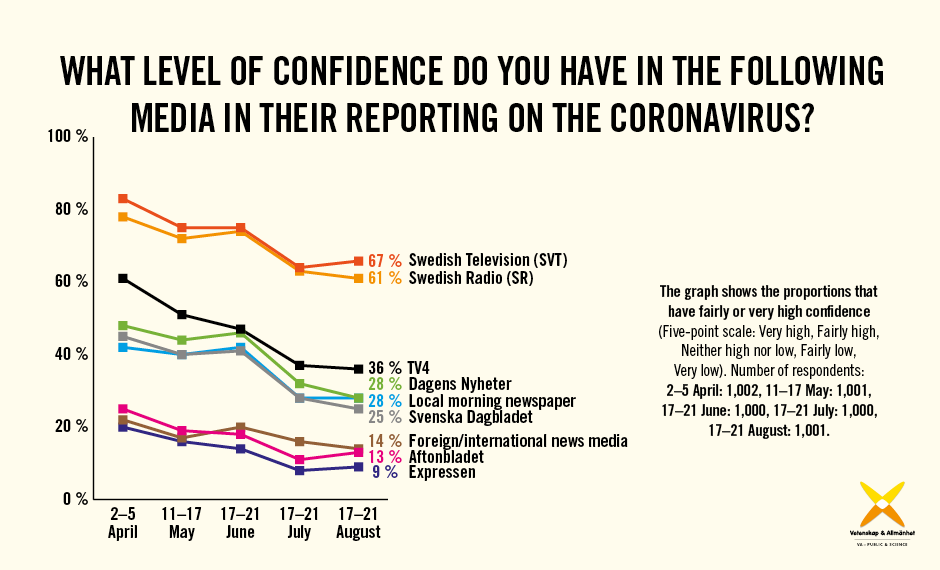Researchers are perceived to be less in agreement in their views on how the corona pandemic is being handled in Sweden. Confidence in various professional groups, however, has not changed since July, nor has Swedes’ consumption and perceptions of the media’s reporting on the coronavirus. These are the latest findings of a study being conducted by the Swedish non-profit organisation VA (Public & Science).
In collaboration with researchers from the Karolinska Institute and Södertörn University, VA (Public & Science) is conducting a study of how people are receiving and interpreting information about the coronavirus and the ongoing pandemic. Here, we present the findings from the eighth wave of the survey, which was undertaken between 17 and 21 August 2020.
Researchers less in agreement
Just over half (54 percent) of Swedes perceive that researchers are fairly or very in agreement in their views on how Sweden is handling the corona pandemic. This is a decrease of seven percentage points compared with the previous survey undertaken in mid-July and 18 percentage points lower than at the beginning of April, when the corresponding proportion was 72 percent. For other professional groups, the differences from the previous survey are not statistically significant.
It is primarily younger people who perceive researchers as less in agreement. Amongst those aged between 18-29, 21 percent perceive researchers as not particularly or not at all in agreement with regard to Sweden’s handling of the pandemic, compared with 12-17 percent in other age groups.
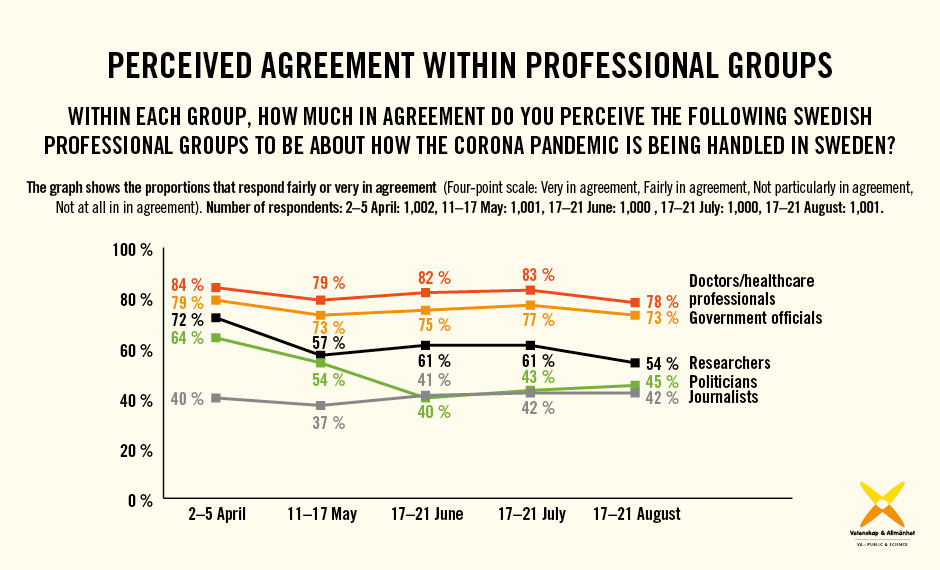
No changes in Swedes’ consumption or views of the media
Swedes access information about the coronavirus through the same news media as they did in July: Swedish Television (SVT) is the most common source of information consumed in the preceding two day period, followed by Aftonbladet, TV4 and Swedish Radio. Men consume Svenska Dagbladet and foreign/international media to a greater extent than women, whereas women consume TV4 to a greater extent. Those living in the large cities (Stockholm, Gothenburg and Malmö) consume Dagens Nyheter and Svenska Dagbladet to a greater extent than those living in other parts of the country. Whereas, these consume local morning newspapers to a greater extent than those living in cities.
Confidence in the media is also unchanged since July. As previously, confidence is greatest in SVT and Swedish Radio and lowest in the evening newspapers (Aftonbladet and Expressen) and in foreign/international media. Men have less confidence than women in all media except foreign/international media, which they have greater confidence in.
Three out of ten Swedes still perceive the tone of reporting on the coronavirus in the media as fairly or very hyped/alarmist, while less than two in ten perceive it as fairly or very cautious/ watchful. One in two Swedes believe that the tone is neither hyped nor watchful. Among supporters of the Sweden Democrats, a larger proportion (24 percent) perceive the tone as watchful/cautious compared to supporters of other parties.
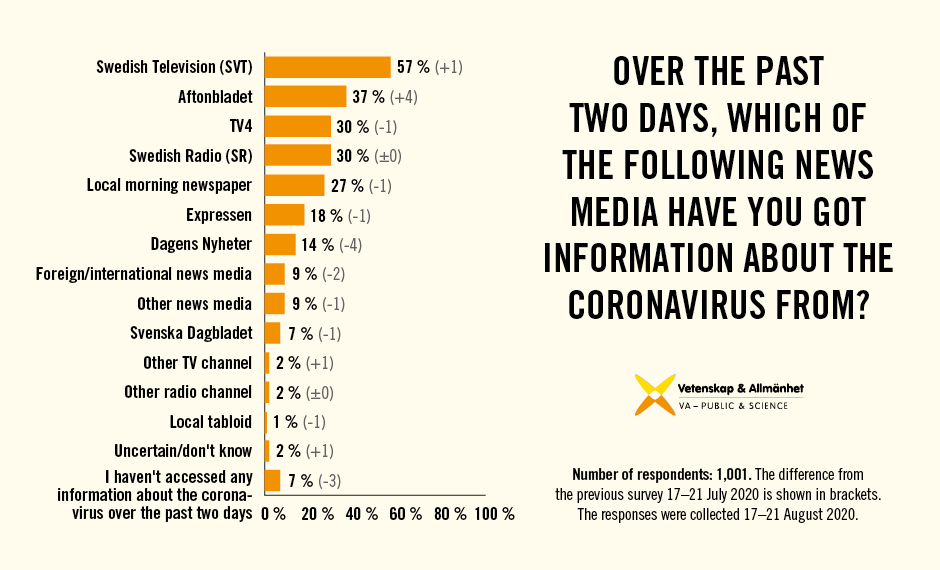
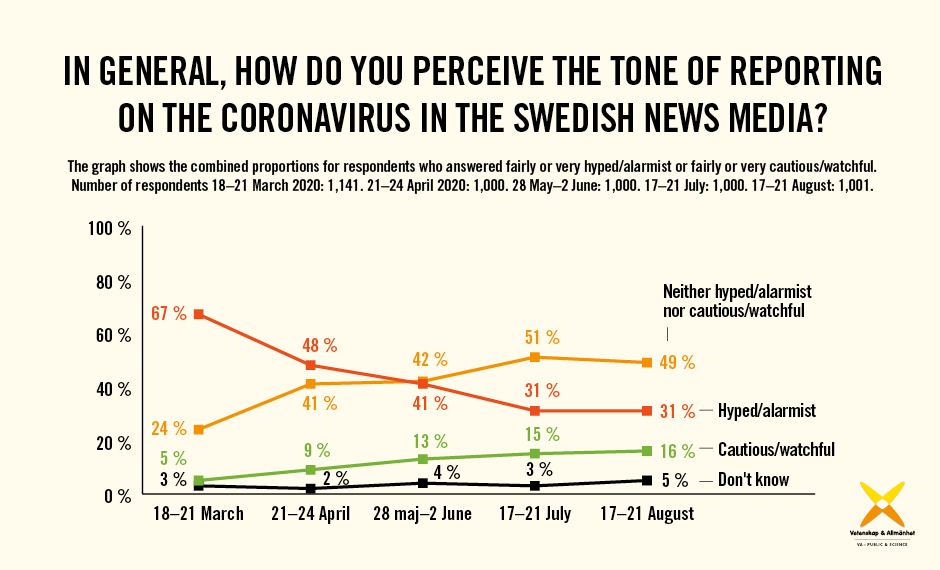
Unchanged confidence in professional groups
Confidence in various professional groups that comment on the coronavirus has not changed in the past month. Swedes continue to have the greatest confidence in doctors and other healthcare professionals and in researchers. Confidence in researchers is lowest among people over the age of 65 and among supporters of the Sweden Democrats. Within these groups, it is 75 and 65 percent respectively who say they have fairly or very high confidence in researchers. Supporters of the Left Party have the greatest confidence in researchers, where the corresponding proportion is 92 percent.
Women have greater confidence than men in government officials who comment on the coronavirus (a difference of ten percentage points). As in previous waves of the survey, supporters of the Centre Party, the Green Party, the Social Democrats and the Left Party have greater confidence in government officials compared with supporters of the Christian Democrats, Moderates and Sweden Democrats.
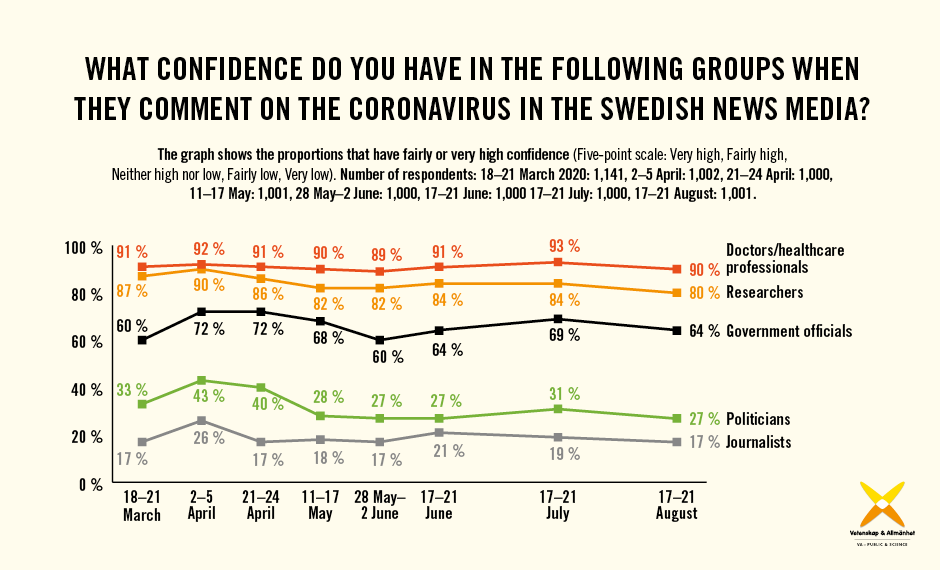
About the survey
The survey was conducted by Kantar Sifo and consisted of 1,001 interviews with a web panel based on random sampling. The interviews were conducted 17–21 August. The results are weighted based on gender, age and region of residence.
In order to monitor the Swedish public’s news consumption, confidence in key professional groups and attitudes towards media reporting over time, we are conducting a number of studies during the course of the pandemic. We also plan to undertake a content analysis of reporting on the coronavirus in the Swedish media in order to map any changes in reporting during different phases, and how this relates to public attitudes during the same time period.
The study is being conducted with the support of the Anne-Marie and Gustaf Anders Foundation for Media Research, Karolinska Institute, LIF – the Swedish Association of the Pharmaceutical Industry, Södertörn University, the Wenner-Gren Foundations and the Swedish Research Council.
Read more about VA’s study and the results of the first, second, third, fourth, fifth, sixth and seventh waves of the study.

